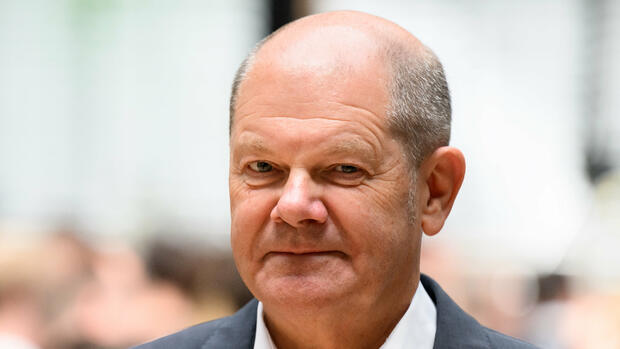The Chancellor is now negotiating with the traffic light groups on the draft law on the GEG.
(Photo: dpa)
Berlin The controversial law on replacing old oil and gas heating systems will be introduced in the Bundestag this week. The heads of the coalition factions reached a compromise on Tuesday afternoon together with Chancellor Olaf Scholz (SPD), Economics Minister Robert Habeck (Greens) and Finance Minister Christian Lindner (FDP). Details of the agreement were not initially known.
This ends a week-long dispute that had developed into a severe stress test for the traffic light coalition. With the agreement that has now been reached, it seems very likely that the amendment to the Building Energy Act (GEG) can be passed by the Bundestag as planned before the summer break.
With the heating law, the federal government wants to ensure more climate protection when heating. From 2024, every newly installed heating system should be operated with at least 65 percent renewable energy.
The traffic light coalition had been arguing about the energy turnaround in the boiler room for weeks. In April, the federal cabinet approved the draft law by Economics Minister Robert Habeck (Greens) and Federal Building Minister Klara Geywitz (SPD). The heads of the SPD, Greens and FDP had previously agreed that the amendment to the GEG should be passed in the Bundestag by the parliamentary summer break.
Nevertheless, the FDP called for a complete revision of the plans for the gradual replacement of the heating system and thwarted the date for the first reading in parliament in May. This would have been the start for the work of the parliamentarians in the Bundestag committees, who could adjust the plans in several points. Economics Minister Habeck then accused the Liberals of “breach of word”.
The group leader of the Greens was convinced that the GEG would be passed before the summer break.
(Photo: dpa)
On Tuesday morning, Habeck appealed to his coalition partners to pass the heating law before the parliamentary summer recess. The GEG has occupied Germany long enough, said the Greens politician. “A lot of debates have been held. It doesn’t get better if you leave it.” It’s now about more than the heating law. “The government should already be demonstrating its ability to govern.”
The liberals are convinced that the original version of the draft law was too rigid. The FDP wanted openness to technology, longer transition periods and less coercion. FDP General Secretary Bijan Djir-Sarai said Tuesday morning that the previous changes to the draft did not go far enough. The law still has enormous deficits, it is inefficient for the climate and unsettles people.
A greener heat supply is necessary because the building sector has so far caused high climate-damaging CO2 emissions. According to the Ministry of Economic Affairs, almost half of the approximately 41 million households in Germany heat with natural gas, followed by heating oil with almost 25 percent and district heating with a good 14 percent.
Direct electricity heating and heat pumps therefore each account for less than three percent. This means that more than 80 percent of the heat requirement is currently covered by burning fossil fuels.
More: GEG – What costs the CO2 price would mean for private households
